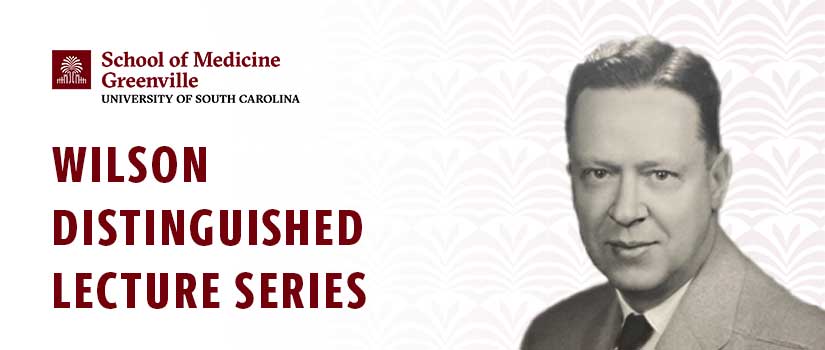2ND ANNUAL LECTURE
Sex Differences in Pain Throughout the Lifespan
Jeffrey S. Mogil, PhD, FCAHS, FRSC
Tuesday, March 26, 2024
5:30 p.m. | C. Dan Adams Lecture Hall
Couldn't make the lecture? Watch it below:
Evidence is emerging that men and women experience pain differently. Pain researchers have now come to some consensus regarding the existence of small quantitative sex differences in the sensitivity to and tolerance of pain in humans. In addition, evidence is rapidly emerging that the sexes may differ qualitatively in their neural mediation of pain and analgesia. That is, different genetic factors, neural circuits, and neuromodulators may be relevant to pain processing in males and females. Dr. Mogil will present several research stories suggestive of fundamental sex dimorphism in pain processing, and the interaction of pain with other biological phenomena including social behavior, memory, and mortality.
Jeffrey S. Mogil, PhD, FCAHS, FRSC, is currently the E.P. Taylor Professor of Pain Studies and a Distinguished James McGill Professor at McGill University. Dr. Mogil has made seminal contributions to the fields of pain genetics, sex differences in pain, and pain testing methods in the laboratory mouse. He has published over 270 manuscripts and book chapters and currently has an h-index of 97. He is the recipient of lifetime achievement awards from the American and Canadian Pain Societies and the Canadian Psychological Association, and is a Fellow of the Canadian Academy of Health Research and the Royal Society of Canada. He has served as Neurobiology Section Editor at the journal, Pain, as a Councilor at the International Association for the Study of Pain, and was the Chair of the Scientific Program Committee of the 13th World Congress on Pain. He is also the founder and director of the North American Pain School.
Millecamps, M., Sotocinal, S.G., Austin, J.-S., Stone, L.S., and Mogil, J.S. Sex-specific effects of neuropathic pain on long-term pain behavior and mortality in mice. Pain, 164:577‑586, 2023. (DOI: 10.1097/j.pain.0000000000002742)
Rosen, S.F., Lima, L.V., Chen, C., Nejade, R., Zhao, M., Nemoto, W., Toprak, E., Skvortsova, A., Tansley, S.N., Zumbusch, A., Sotocinal, S.G., Pittman, C., and Mogil, J.S. Olfactory exposure to late pregnant and lactating mice causes stress-induced analgseia in male mice. Science Advances, 8:eabi9366, 2022. (DOI: 10.1126/sciadv.abi9366)
Muralidharan, A., Sotocinal, S.G., Yousefpour, N., Akkurt, N., Lima, L.V., Tansley, S., Parisien, M., Wang, C., Austin, J.-S., Ham, B., Dutra, G.M.G.S., Rousseau, P., Maldonado-Bouchard, S., Clark, T., Rosen, S.F., Majeed, M.R., Silva, O., Nejade, R., Li, X., Donayre Pimentel, S., Nielsen, C.S., Neely, G.G., Autexier, C., Diatchenko, L., Ribeiro-da-Silva, A., and Mogil, J.S. Long-term male-specific chronic pain via telomere- and p53-mediated spinal cord cellular senescence. Journal of Clinical Investigation, 132:e151817, 2022. (DOI: 10.1172/JCI151817)
Tansley, S., Uttam, S., Guzman, A.U., Yaqubi, M., Pacis, A., Parisien, M., Deamond, H., Wong, C., Rabau, O., Brown, N., Haglund, L., Ouellet, J., Santaguida, C., Ribeiro-da-Silva, A., Tahmasebi, S., Prager-Khoutorksy, M., Ragoussis, J., Zhang, J., Salter, M.W., Diatchenko, L., Healy, L.M.*, Mogil, J.S.*, and Khoutorsky, A.* Single-cell RNA sequencing reveals time- and sex-specific responses of mouse spinal cord microglia to peripheral nerve injury and links ApoE to chronic pain. Nature Communications, 13:843, 2022. (*co-corresponding authors) (DOI: 10.1038/s41467-022-28473-8)
Linnstaedt, S.D., Rueckeis, C.A., Riker, K.D., Pan, Y., Wu, A., Yu, S., Wanstrath, B., Gonzalez, M., Harmon, E., Green, P., Chen, C., King, T., Lewandowski, C., Hendry, P.L., Pearson, C., Kurz, M.C., Datner, E., Velilla, M.A., Domeier, R., Liberzon, I., Mogil, J.S., Levine, J., and McLean, S.A. microRNA-19b predicts widespread pain and posttraumatic stress symptom risk in a sex-dependent manner following trauma exposure. Pain, 161:47-60, 2020. (DOI: 10.1097/j.pain.0000000000001709)
Mogil, J.S. Qualitative sex differences in pain processing: evidence of a biased literature. Nature Reviews Neuroscience, 21:353-364, 2020. (DOI: 10.1038/s41583-020-0310-6)
Raja, S.N., Carr, D.B., Cohen, M., Finnerup, N.B., Flor, H., Gibson, S., Keefe, F.J., Mogil, J.S., Ringkamp, M., Sluka, K.A., Song, X.-J., Stevens, B., Sullivan, M., Tutelman, P., Ushida, T., and Vader, K. The revised IASP definition of pain: concepts, challenges, and compromises. Pain, 161:1976-1982, 2020. (DOI: 10.1097/j.pain.000000000001939)
Boerner, K.E., Chambers, C.T., Gahagan, J., Keogh, E., Fillingim, R.B., and Mogil, J.S. The conceptual complexity of gender and its relevance to pain. Pain, 159:2137-2141, 2018. (DOI: 10.1097/j.pain.0000000000001275)
Mapplebeck, J.C.S., Dalgarno, R., Tu, Y.S., Moriarty, O., Beggs, S., Kwok, C.H.T., Halievski, K., Assi, S., Mogil, J.S., Trang, T., and Salter, M.W. Microglial P2X4R-evoked pain hypersensitivity is sexually dimorphic in rats. Pain, 159:1752-1763, 2018. (DOI: 10.1097/j.pain.0000000000001265)
Klein, S.L., Schiebinger, L., Stefanick,M.L., Cahill, L., Danska, J., de Vries, G.J., Kibbe, M.R., McCarthy, M.M., Mogil, J.S., Woodruff, T.K., and Zucker, I. Sex inclusion in basic research drives discovery. Proceedings of the National Academy of Sciences, USA, 112:5257-5258, 2015. (DOI: 10.1073/pnas.1502843112)
Sorge, R.E., Mapplebeck, J.C.S., Rosen, S., Beggs, S., Taves, S., Alexander, J.K., Martin, L.J., Austin, J.-S., Sotocinal, S.G., Chen, D., Yang, M., Shi, X.Q., Huang, H., Pillon, N.J., Bilan, P.J., Tu, Y., Klip, A., Ji, R.-R., Zhang, J., Salter, M.W. and Mogil, J.S. Different immune cells mediate mechanical pain hypersensitivity in male and female mice. Nature Neuroscience, 18:1081-1083, 2015. (DOI: 10.1038/nn.4053)
Sorge, R.E., Martin, L.J., Isbester, K.A., Sotocinal, S.G., Rosen, S., Tuttle, A.H., Wieskopf, J.S., Acland, E.L., Dokova, A., Kadoura, B., Leger, P., Mapplebeck, J.C.S., McPhail, M., Delaney, A., Wigerblad, G., Schumann, A.P., Quinn, T., Frasnelli, J., Svensson, C.I., Sternberg, W.F., and Mogil, J.S. Olfactory exposure to males, including human males, stresses rodents. Nature Methods, 11:629-632, 2014. (DOI:10.1038/nmeth.2935)
Dr. Mogil’s laboratory https://mogilab.ca/
For more information about Dr. Mogil, visit:
https://www.mcgill.ca/psychology/jeffrey-mogil
Past Lectures
Dr. Klein gave a lecture on Sex-Specific Differences and Pregnancy Impact Outcomes from COVID-19 Infection and Vaccination.
The ongoing COVID-19 pandemic has increased awareness about sex-specific differences in immunity and outcomes following respiratory virus infections. Strong evidence of a male bias in COVID-19 disease severity will be presented based on clinical data and preclinical animals models, which illustrate sex differential immune responses against SARS-CoV-2. Prior to the pandemic, data from other viral infections, including influenza viruses, showed profound sex differences in virus-specific immunity, including locally in the respiratory tract. We have used influenza A viruses to interrogate sex-specific immunity to infection and vaccination. Although males are more susceptible to most viral infections, females possess immunological features that contribute to greater vulnerability to immune-mediated pathology while experiencing better protection following vaccination. Both sex chromosome complement and related X-linked genes (e.g., TLR7) as well as sex steroids, including estrogens and androgens, play important roles in mediating the development of sex differences in immunity to respiratory viral infections and vaccination.
About Dr. Klein
 Dr. Klein is a Professor of Molecular Microbiology & Immunology, Biochemistry & Molecular
Biology, and International Health at the Johns Hopkins Bloomberg School of Public
Health and Department of Medicine at the Johns Hopkins School of Medicine. She is
an expert on sex and gender differences in immune responses and susceptibility to
infection and vaccination, with interrogation of sex-specific effects of aging in
humans and animal models. She currently has over 175 peer-reviewed publications, authored
several book chapters, and edited three books on the broad topics of sex differences
in response to infection and treatments for infectious diseases. During the 2009 influenza
pandemic, she was commissioned by the WHO to evaluate and publish a report on the
impact of sex, gender, and pregnancy on the outcome of influenza virus infection.
During the current COVID-19 pandemic, Dr. Klein has written commentaries for several
journals and been interviewed by several major news media outlets about sex differences
in immunity, disease outcomes, and responses to vaccines. She is: PI of the Johns
Hopkins Specialized Center for Research Excellence (SCORE) in sex and age differences
in immunity to influenza, MPI of the Johns Hopkins COVID-19 Serology Center of Excellence,
MPI of an NIH Merit Award to study sex differences in the pathogenesis of respiratory
microbial infections, co-chair of the advisory board of the Johns Hopkins Building
Interdisciplinary Research Careers in Women’s Health, member of the Advisory Committee
on Research on Women’s Health at NIH, co-director of the Johns Hopkins Center for
Women’s Health, Sex, and Gender Research, and a fellow of the American Academy of
Microbiology and the American Association for the Advancement of Science.
Dr. Klein is a Professor of Molecular Microbiology & Immunology, Biochemistry & Molecular
Biology, and International Health at the Johns Hopkins Bloomberg School of Public
Health and Department of Medicine at the Johns Hopkins School of Medicine. She is
an expert on sex and gender differences in immune responses and susceptibility to
infection and vaccination, with interrogation of sex-specific effects of aging in
humans and animal models. She currently has over 175 peer-reviewed publications, authored
several book chapters, and edited three books on the broad topics of sex differences
in response to infection and treatments for infectious diseases. During the 2009 influenza
pandemic, she was commissioned by the WHO to evaluate and publish a report on the
impact of sex, gender, and pregnancy on the outcome of influenza virus infection.
During the current COVID-19 pandemic, Dr. Klein has written commentaries for several
journals and been interviewed by several major news media outlets about sex differences
in immunity, disease outcomes, and responses to vaccines. She is: PI of the Johns
Hopkins Specialized Center for Research Excellence (SCORE) in sex and age differences
in immunity to influenza, MPI of the Johns Hopkins COVID-19 Serology Center of Excellence,
MPI of an NIH Merit Award to study sex differences in the pathogenesis of respiratory
microbial infections, co-chair of the advisory board of the Johns Hopkins Building
Interdisciplinary Research Careers in Women’s Health, member of the Advisory Committee
on Research on Women’s Health at NIH, co-director of the Johns Hopkins Center for
Women’s Health, Sex, and Gender Research, and a fellow of the American Academy of
Microbiology and the American Association for the Advancement of Science.
For more information about Dr. Klein, visit:

